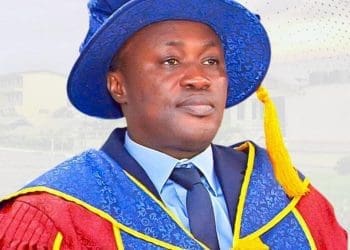Distinguished Ghanaian educationist and global thought leader, Professor Kwame Akyeampong, has called for a radical rethink of how education is conceived, delivered, and evaluated across Africa, warning that the continent’s persistent “learning crisis” has become not just an academic problem but a moral and social injustice of global proportions.
Speaking at the launch of his latest book in Accra on Wednesday, October 22, 2025, the Professor of International Education and Development and Founding Director of the Centre for the Study of Global Development at the Open University (UK) said Africa’s education systems continue to fail millions of children despite decades of international commitments to achieve “education for all.”
The new book, titled “Reconceptualising the Learning Crisis in Africa: Multi-dimensional Pedagogies of Accelerated Learning Programs”, co-authored with Dr Sean Higgins, seeks to provoke serious reflection and debate about how African education can be made more inclusive, relevant, and transformative.
“It is a great honour to have you all here at the launch of this book by myself and Dr Sean Higgins,” Prof. Akyeampong told the audience.
“The issues we raise are designed to start a deeper debate on how we can take African education forward.”
A broken promise of quality education
Tracing the historical roots of Africa’s education challenges, Prof. Akyeampong noted that the continent’s struggle to deliver quality education has persisted despite decades of pledges — from the 1990 Jomtien Conference on Education for All, through the Millennium Development Goals (MDGs), to the Sustainable Development Goals (SDGs).
“We all know about Jomtien, where the Education for All agenda was established. Fifteen years after that, we moved to the MDGs, but we still had not achieved quality education for all,” he lamented.
“Now, with the 2030 targets, all indications show that we may not meet them either.”
He said the situation was dire: millions of African children remain out of school, while those in school often fail to acquire basic literacy and numeracy skills.
“The crisis is simple,” he said. “Millions of children are out of school, and many who are in school are not learning. Alarmingly, Africa is the only region in the world where the number of out-of-school children is increasing.”
Prof. Akyeampong described this as both a “moral crisis” and a failure to deliver on the universal right to free, quality-based education.
“The education these children desperately need to transform their lives is being denied them,” he stressed. “This is not just a policy failure — it is a moral one.”
Challenging deficit thinking
Prof. Akyeampong was critical of what he called “deficit thinking” — the tendency to blame African children, teachers, or communities for poor educational outcomes.
“The problem is not the African child, nor the teacher, nor the community,” he said. “When education is framed as though the deficit lies with the child or teacher, interventions are shaped in harmful ways.”
He said this narrative often portrays African learners as inferior or needy compared to their global counterparts, erasing their agency and cultural identity.
“Their experiences, knowledge, and agency are erased, and they are positioned as subjects needing to be saved by outsiders,” he added.
“This gives agency to international ‘fixers’ while denying it to local communities. It is wrong and deeply harmful.”
The language barrier
A major factor undermining learning outcomes, according to Prof. Akyeampong, is the language of instruction.
He criticised the widespread practice of teaching children in languages they do not understand, particularly in their early years.
“It should never be the case that an African child should go into a classroom and be taught in a language they do not understand,” he stated.
“Research shows that early-grade instruction in the mother tongue improves comprehension, participation, and self-worth.”
He recalled that in Ghana, children were once taught in their local languages using textbooks produced by Basel missionaries more than 150 years ago — a practice that respected children’s cultural context but has since been abandoned.
“When children cannot understand the language of instruction, learning breaks down and inequality is reproduced,” he warned.
Restoring dignity to teachers
Prof. Akyeampong also took issue with the growing trend of giving teachers rigid, pre-prepared materials to deliver in classrooms without adaptation.
“Teachers are treated as obstacles rather than agents of learning,” he said.
“This undermines their professionalism and strips them of the ability to contextualise lessons for their students.”
He emphasised that teachers are not mere implementers but key drivers of learning, bringing cultural insight and wisdom that should be recognised and celebrated.
Homegrown solutions and Ubuntu pedagogy
Drawing on successful local programmes such as Ghana’s Complementary Basic Education (CBE) and School for Life, Prof. Akyeampong urged African countries to celebrate and scale up indigenous success stories that have helped thousands of children acquire literacy within months.
“We have solutions in Africa that work, but we do not celebrate or scale them,” he said. “It is unacceptable that a child spends three years in school and still cannot read or write. That is not the child’s fault — it is ours.”
He called for Afrocentric pedagogies rooted in the African philosophy of Ubuntu — the belief in shared humanity — to make learning more community-driven and compassionate.
“Ubuntu calls us to ensure that every child’s progress is our shared responsibility,” he said. “When a child reaches Grade 6 unable to read or write, the entire community has failed that child.”
A pedagogy of care and compassion
Prof. Akyeampong urged African governments to design education systems that balance academic learning with care, compassion, and community connectedness.
“Learning should be connected to children’s natural environments and realities,” he said. “When educational materials reflect their lived experiences, it ignites curiosity and deepens understanding.”
He concluded with a call for urgency and commitment, insisting that every African child should be able to read and write by the end of Grade 3.
“We have the capacity, the tools, and the knowledge,” he said. “Development that benefits only a privileged few while leaving disadvantaged children behind is not development — it is exclusion.”
Prof. Akyeampong’s book launch attracted a cross-section of educators, policymakers, and development practitioners, all of whom echoed his call for a paradigm shift in how Africa approaches the education of its future generations.













